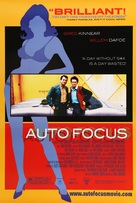Reviews provided by RottenTomatoes
Glenn Lovell, San Jose Mercury News: Often as poignant as it is perverse. Read more
Ty Burr, Boston Globe: With nary a glimmer of self-knowledge, [Crane] becomes more specimen than character -- and Auto Focus remains a chilly, clinical lab report. Read more
Terry Lawson, Detroit Free Press: You may want to fast-forward to a movie with a point. Read more
Rene Rodriguez, Miami Herald: Watching this cold, detached movie, you never get the sense that Schrader cares one whit about Crane or is even curious about understanding the compulsions that wrecked his marriage and career and eventually cost him his life. Read more
Richard Roeper, Ebert & Roeper: You don't have to know anything about Bob Crane, you don't to have ever watched Hogan's Heroes, and you can still appreciate the skill behind this film. Read more
Michael Wilmington, Chicago Tribune: Does strongly benefit from its overall smartness and lucidity, and from two very canny, well-thought-out performances by Kinnear and Dafoe. Read more
A.O. Scott, New York Times: Gets to you like a low-grade fever, a malaise with no known antidote. Read more
Moira MacDonald, Seattle Times: A well-crafted film about the life and death of TV actor Bob Crane. Read more
Manohla Dargis, Los Angeles Times: Strangely wonderful and weirdly touching. Read more
Eric Harrison, Houston Chronicle: Kinnear throws himself into the role, but because he's playing a bad actor who's unaware he's acting, his skill may not always be apparent. Read more
Steven Rosen, Denver Post: Schrader, I think, has found an approach that suits the skewed cultural history of his material. Read more
Lisa Schwarzbaum, Entertainment Weekly: The performances are vividly alive. Read more
Rick Groen, Globe and Mail: How do you make a movie with depth about a man who lacked any? On the evidence before us, the answer is clear: Not easily and, in the end, not well enough. Read more
Jane Sumner, Dallas Morning News: It's a provocative, challenging study in denial and one of its star's and its director's all-time bests. Read more
Ella Taylor, L.A. Weekly: [Kinnear's] marvelously ambiguous and deliciously blank here, lending a slightly sinister cast to every harmless, handsome man he's ever played. Read more
Jan Stuart, Newsday: The brave conduit of Schrader's doom-laden moralism is Greg Kinnear, giving one of those revelatory performances that makes everything an actor does prior seem like marking time. Read more
Peter Rainer, New York Magazine/Vulture: Schrader really isn't interested in Crane except as the straw man for his moral lessons about sin and sexuality and the nature of celebrity. Read more
David Edelstein, NPR's Fresh Air: Read more
Jami Bernard, New York Daily News: Kinnear's performance is a career-defining revelation. Read more
Andrew Sarris, New York Observer: Everything in the movie rises and falls dismally, with little sense even of waste and loss. Read more
James Berardinelli, ReelViews: A compelling motion picture that illustrates an American tragedy. Read more
Roger Ebert, Chicago Sun-Times: A hypnotic portrait of this sad, compulsive life. Read more
Stephanie Zacharek, Salon.com: [Kinnear's] performance has to be one of the most sympathetic acts of decency one actor has ever extended to another. Read more
Edward Guthmann, San Francisco Chronicle: A compelling, sympathetic portrait. Read more
Geoff Pevere, Toronto Star: [Crane] is played with a touching, eager-to-please obliviousness by Greg Kinnear. Read more
Mike Clark, USA Today: Michael Gerbosi's script is economically packed with telling scenes. Read more
Todd McCarthy, Variety: This true-life saga of sex, lies and videotape is one of director Paul Schrader's best films, and like Boogie Nights ranks as a shrewd expose of recent Hollywood's slimy underside. Read more
J. Hoberman, Village Voice: This sexaholic Lost Weekend is way too punitive -- the celebrity version of Looking For Mr. Goodbar. Read more
Desson Thomson, Washington Post: Admirably unconventional film. Read more
Stephen Hunter, Washington Post: It never answers the key question: Why should we care? Read more

